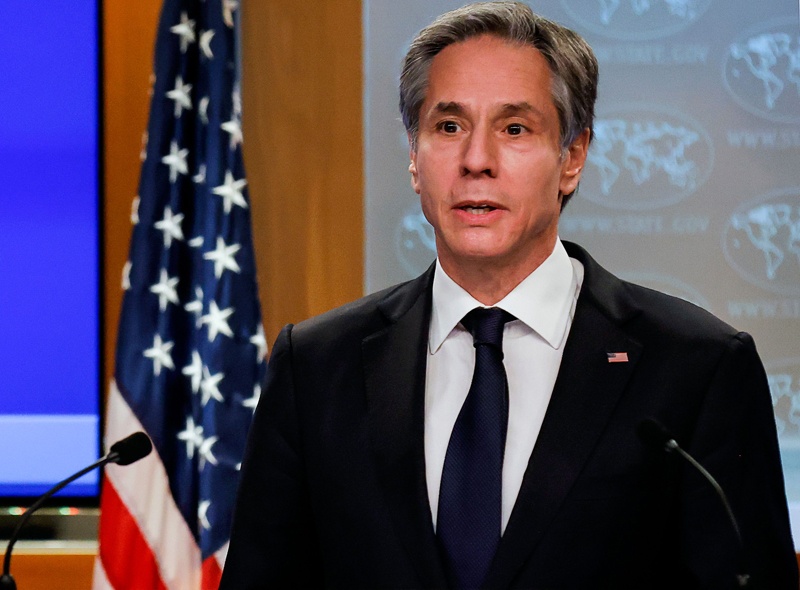 US Secretary of State Antony Blinken
US Secretary of State Antony Blinken
ANKARA: Turkey yesterday accused the United States of supporting "terrorists" and summoned its ambassador after Washington declined to immediately back Ankara's claim of Kurdish militants executing 13 of its nationals in Iraq. The Turkish interior ministry also announced the detention of hundreds of people it accuses of links to the outlawed Kurdistan Workers' Party (PKK) rebels that allegedly shot dead the 13 hostages in an Iraqi cave.
The PKK blamed Turkish airstrikes for the deaths in a diplomatically-charged episode that delivers an immediate challenge to the new US administration of President Joe Biden in the Middle East. Ankara on Sunday said the hostages - most of them soldiers and police - were executed as Turkish forces advanced in a rescue operation launched in the mountains of northern Iraq last week.
The Turkish anger was directed at a US State Department statement on Sunday saying Washington "deplores the death of Turkish citizens" but awaits further confirmation of Ankara's version of events. "If reports of the death of Turkish civilians at the hands of the PKK, a designated terrorist organization, are confirmed, we condemn this action in the strongest possible terms," the State Department said.
Turkish President Recep Tayyip Erdogan branded Washington's response "a farce". "You said you did not support terrorists, when in fact you are on their side and behind them," he said in televised remarks. The Turkish foreign ministry then summoned US Ambassador David Satterfield to express Ankara's displeasure "in the strongest possible terms".
Later yesterday, US Secretary of State Antony Blinken told his Turkish counterpart Mevlut Cavusoglu that "PKK terrorists" were responsible for the deaths of Turkish hostages in northern Iraq. "The Secretary expressed condolences for the deaths of Turkish hostages in northern Iraq and affirmed our view that PKK terrorists bear responsibility," State Department spokesman Ned Price said in a statement.
The PKK militants have been waging an insurgency against the Turkish state since 1984 that is thought to have left tens of thousands dead. The group is recognized as a terrorist organization by Washington and most of Turkey's other Western allies. But Washington works in Syria with another Kurdish militia that Turkey views as a branch of the PKK.
A breakdown in peace talks between the PKK and Ankara in 2015 was followed by Turkish military campaigns against the militants across the region and mass arrests of pro-Kurdish politicians and officials in Turkey. The Turkish interior ministry said yesterday that it had detained 718 people-including the heads of pro-Kurdish Peoples' Democratic Party (HDP) - in cities and districts across the country in a series of coordinated raids.
The HDP is Turkey's second-largest opposition party. It denies all formal links to the PKK but also questions Turkey's account of the 13 deaths. We "express our deepest regret and condolences to the families and loved ones of those 13 people who by no means were capable of protecting themselves against an armed attack," the HDP said in a statement on Sunday.
The incident threatens to escalate tensions across Iraq and Syria while delivering an early test to Erdogan's relations with Biden. Turkey has long accused the Iraqi government of being too tolerant of the PKK. Ankara also wants Washington to renounce the Kurdish militia in Syria it has been backing against President Bashar Al-Assad because of its alleged links to the PKK. It instead wants Washington to reaffirm its support for Turkey's anti-terror campaign.
Erdogan said Turkey's NATO allies had to pick sides. "If we are going to be in NATO together, you should be sincere. You should not be on the terrorists' side," Erdogan said. "After this, there are two options. Either act with Turkey with no ifs or buts, without questioning, or they will be a partner to every murder and bloodshed," he said. "The terrorist organization on our doorstep, on our borders, is killing innocents."
Erdogan's rebuke of the US contrasts with his efforts over the past few months to strike a softer tone and mend torn relations with the West. Erdogan is still waiting for a phone call from Biden that could help set the tone for future US-Turkish ties. - AFP




